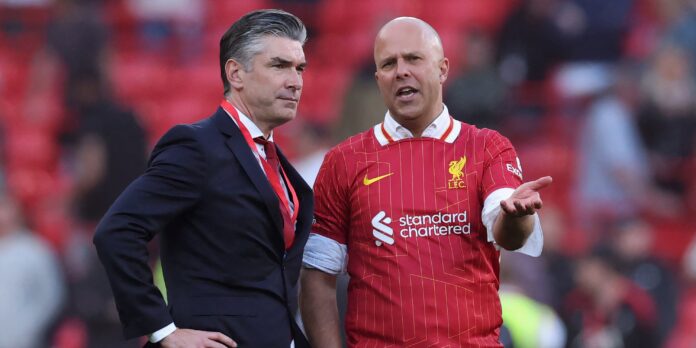Liverpool’s Monumental Summer: One for the Ages
Liverpool’s Transfer Window Marks a New Era
The dust has finally settled on a transfer window that will be spoken about for years to come. James Pearce, writing in The Athletic, captured the scale of Liverpool’s overhaul in forensic detail. What unfolded was not simply a busy summer, but a radical reshaping of a squad that had just delivered the Premier League title.
From Virgil van Dijk’s spring warning — “I think they’re planning to make it a big summer, so we all have to trust the board to do the right job” — to Arne Slot’s talk of “extra weapons”, the signs were there. What followed was unprecedented: £449m spent on new recruits, over £700m in total business when including outgoings, and two record-breaking transfers in a single summer.
Pearce noted that, “Fenway Sports Group CEO of football Michael Edwards and sporting director Richard Hughes view the recent window as a one-off in terms of how much needed to be addressed.” And that context is vital: Liverpool have not abandoned their model. They have doubled down on it.
The Statement Signings
Liverpool have rarely moved for the finished article. That changed with Florian Wirtz and Alexander Isak.
As Pearce explained: “It was the first time Liverpool had spent big on an elite, finished article since goalkeeper Alisson arrived from Roma for £65m in 2018 — seven months after the similarly transformative signing of centre-back Virgil van Dijk.”
Wirtz’s £116m capture from Bayer Leverkusen was a coup that underlined Liverpool’s pulling power. He was the No. 1 target, even when Lyon’s Rayan Cherki or others were on the radar. As Pearce put it, “Lyon’s Rayan Cherki, who subsequently joined City, was among the alternatives. But Wirtz was always the No 1 target as Slot looked for a different type of No 10 to Dominik Szoboszlai.”
Then came Isak. A £125m saga, acrimonious and dragged through the summer, that finally broke Newcastle’s resolve. In one move, Liverpool made the Swede the most expensive player in British football history.
Slot wanted dominance. Wirtz and Isak were not just signings, they were statements.

The Logic Behind the Spending
On the surface, Liverpool’s outlay looks like reckless abandon. Yet Pearce was clear that the financials tell a different story: “A net spend of £189m is eye-catching but has to be put in the context of Liverpool making a £52m profit on their dealings in 2024. It works out as a net spend of £68.5m across each of the past two summers.”
This is a club that has played the long game. Prudence in previous years gave them the scope to go big now. Record revenues and a title win only added weight.
And it was not just about splashing the cash. Every player signed, aside from Freddie Woodman, was under 25. As Pearce emphasised: “They believe they have future-proofed the squad and the kind of spending spree witnessed this summer will not need to be repeated.”
This is not Chelsea’s scattergun, nor Manchester United’s desperation. This was carefully planned upheaval.
The Pain of Change
For all the glamour of new arrivals, Liverpool’s rebuild was also about departures. Trent Alexander-Arnold’s exit to Real Madrid epitomised both loss and opportunity. A fee of £10m was negotiated despite his expiring contract, a shrewd move in a summer of ruthless decisions.
Luis Díaz, Darwin Núñez, Caoimhín Kelleher, Kostas Tsimikas, Jarell Quansah — all gone. Pearce reminded us of the context too: the heartbreak of “the tragedy of Diogo Jota’s death alongside his brother, Andre Silva, in July.” Transfers took a back seat, briefly.
This was a summer shaped as much by grief as by ambition.
Building for Slot’s Liverpool
Arne Slot has not simply inherited Klopp’s Liverpool; he is making it his own.
The recruitment strategy reflected his vision: players who fit a system of intensity, pressing, and ruthlessness. Jeremie Frimpong’s arrival offers both versatility and future planning. Giorgi Mamardashvili and Milos Kerkez represent succession. Giovanni Leoni is one for tomorrow.
And through it all, Slot’s voice carried weight. His meeting with Wirtz was decisive, convincing the German playmaker of his role. As Wirtz’s father said: “Arne Slot presented his playing philosophy, the team tactics for possession and pressing, and how Florian can develop his strengths in these areas. That made a decisive impression on Florian.”
This is not simply a new Liverpool team. It is the birth of a new Liverpool identity.
A Squad to Last
By deadline day, the numbers were dizzying. Records broken, rivals outmanoeuvred, fans exhausted by the torrent of ins and outs. Yet there was method in the madness.
Pearce concluded with the sentiment within the club: “It has been a frantic few months, but now, there is a belief within Anfield that this is a squad built to last the pace both domestically and in Europe.”
Liverpool have built not just for 2025, but for 2030. The financial model holds. The squad is younger, deeper, and tailored to Slot’s demands.
This was not a reckless gamble, but a calculated revolution.
Conclusion
Liverpool’s summer was unlike anything the Premier League has seen before. As James Pearce documented in The Athletic, it was an exercise in both ruthlessness and foresight.
The club shattered records, but did so with logic. They said goodbye to heroes, but future-proofed the squad. They mourned a tragedy, but also built a team to honour it with success.
Slot wanted “extra weapons”. He has them now. Whether this bold gamble delivers the ultimate prize in Europe remains to be seen. But Liverpool’s intent is clear: this is a new dynasty in the making.



